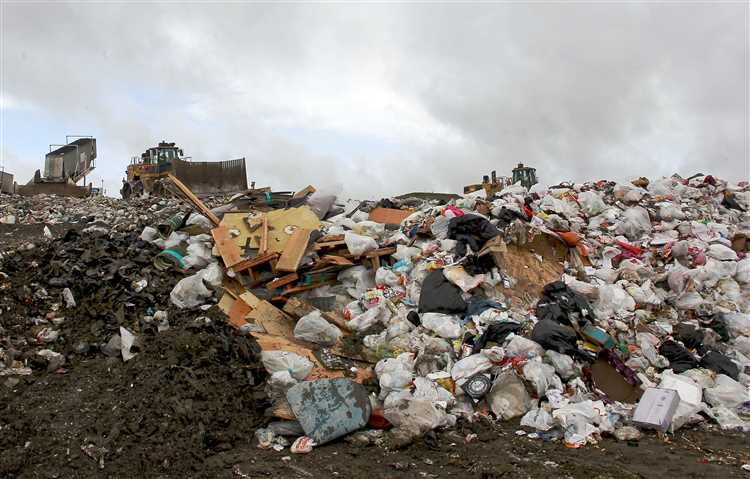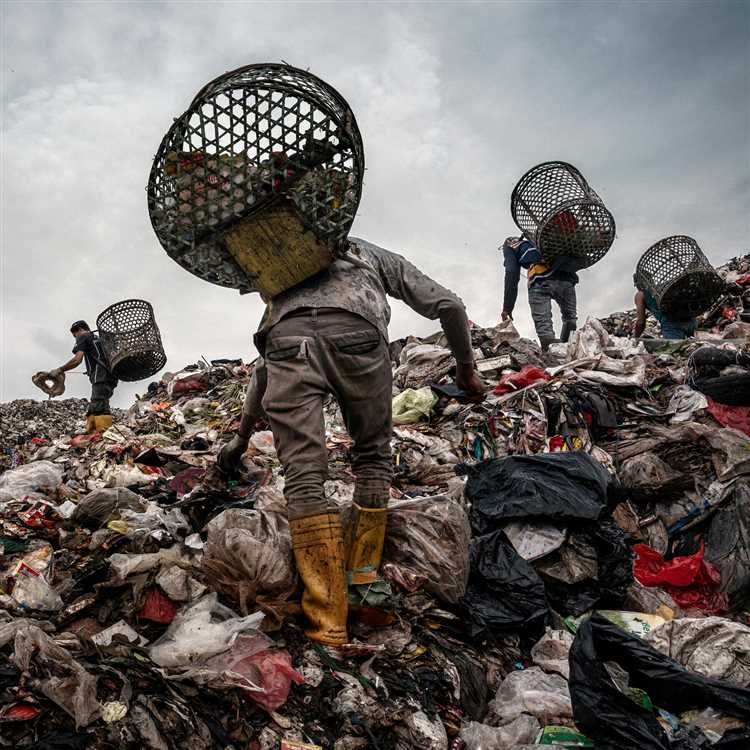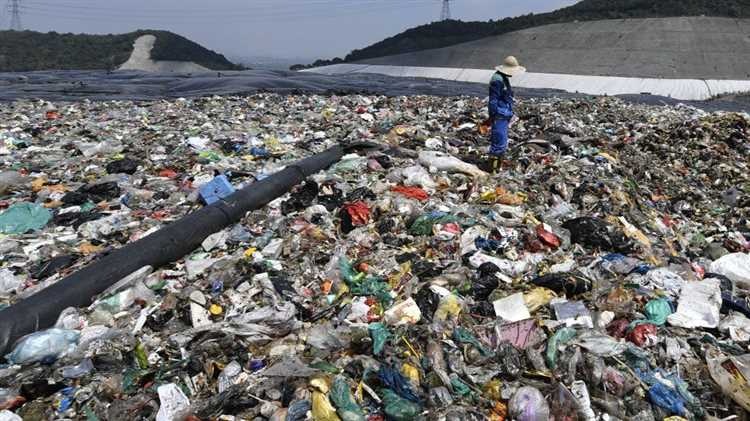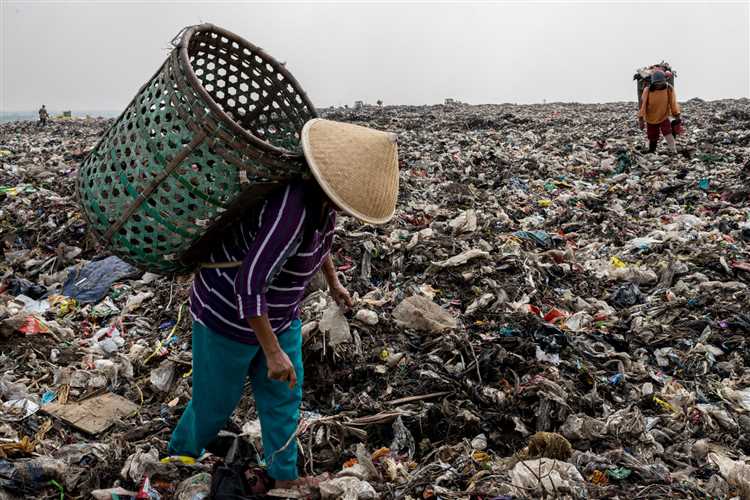
Waste management is a pressing issue that affects the environment and public health worldwide. One of the major challenges is finding effective solutions for disposing of waste without causing harm to the planet. While many countries struggle with managing their waste, there are a few shining examples of nations that have successfully eliminated the need for landfills.
These forward-thinking countries have implemented innovative waste management practices that prioritize recycling, composting, and waste-to-energy technologies. By reducing the amount of waste sent to landfills, these nations are leading the way towards a more sustainable future.
One such country is Sweden, which is renowned for its exceptional waste management system. Less than 1% of Sweden’s household waste ends up in landfills. This impressive achievement is a result of the country’s commitment to recycling and waste-to-energy incineration. Sweden has invested heavily in state-of-the-art waste treatment facilities that convert non-recyclable waste into heat and electricity, powering homes and businesses across the country.
Another country that has made significant strides in waste management is Singapore. Despite its limited land area, Singapore has managed to achieve a high recycling rate and minimize waste sent to landfills. The city-state has implemented strict regulations and incentives to encourage recycling, such as a comprehensive recycling program and a mandatory waste separation scheme. Singapore also utilizes advanced waste-to-energy incineration facilities to convert non-recyclable waste into energy.
These countries serve as inspiration for the rest of the world, demonstrating that effective waste management practices are possible with the right policies and investments. By prioritizing recycling, composting, and waste-to-energy technologies, these nations have shown that it is indeed possible to reduce reliance on landfills and create a more sustainable future for generations to come.
- Countries with No Landfills
- Singapore
- Ghana
- Eco-Friendly Waste Management
- 1. Recycling and Composting
- 2. Waste-to-Energy Conversion
- Efficient Recycling Practices
- 1. Comprehensive Recycling Programs
- 2. Education and Awareness
- 3. Advanced Sorting and Processing Facilities
- 4. Collaborative Efforts
- 5. Continuous Improvement
- Alternative Energy Generation
- Solar Energy
- Wind Energy
- Reducing Plastic Waste
- Innovative Composting Techniques
- 1. Aerated Static Pile Composting
- 2. Vermicomposting
- 3. In-Vessel Composting
- 4. Bokashi Composting
- Government Policies and Initiatives
- 1. Waste Segregation and Recycling Programs
- 2. Waste-to-Energy Technologies
- Q&A
- What are some countries that have no landfills?
- How do countries without landfills handle their waste?
- Why are landfills considered bad for the environment?
- What are the benefits of countries having no landfills?
- Are there any challenges faced by countries without landfills?
- Why are landfills a problem?
- Which countries have successfully eliminated landfills?
Countries with No Landfills
Proper waste management is crucial for sustainable development and environmental preservation. One of the most significant challenges in waste management is the disposal of waste in landfills. Landfills not only take up valuable land resources but also pose serious threats to human health and the environment.
Fortunately, there are several countries around the world that have implemented innovative waste management practices and successfully eliminated the need for landfills. These countries serve as shining examples for others to follow in their efforts to reduce waste and promote a circular economy.
Singapore
Singapore is a small island city-state known for its efficient waste management system. The country has limited land resources and recognizes the importance of minimizing waste generation and maximizing resource recovery. Through a combination of recycling, waste-to-energy incineration, and the adoption of advanced technologies, Singapore has managed to achieve almost zero waste sent to landfills.
The government has implemented various initiatives to encourage recycling and waste reduction, such as the mandatory recycling program and the implementation of a waste-to-energy incineration plant. Additionally, Singapore has invested in advanced waste management technologies, including automated waste collection systems and smart bins, to improve efficiency and reduce the environmental impact of waste disposal.
Ghana
Ghana is a developing country in West Africa that has made significant progress in waste management in recent years. The government of Ghana has taken steps to promote responsible waste management practices and reduce the reliance on landfills. Instead of focusing solely on waste disposal, the country has shifted towards waste reduction, recycling, and composting.
Ghana has implemented a waste segregation system and initiated recycling programs for plastic, paper, metal, and e-waste. The government has also promoted the use of composting as a means of converting organic waste into valuable fertilizer. These efforts have not only reduced the amount of waste sent to landfills but have also created employment opportunities and contributed to the country’s sustainable development goals.
These countries demonstrate that with proper planning, investment, and the adoption of comprehensive waste management strategies, it is possible to eliminate the need for landfills. By prioritizing waste reduction, recycling, and resource recovery, these countries are leading the way towards a more sustainable future.
Eco-Friendly Waste Management

Eco-friendly waste management practices play a crucial role in preserving the environment and reducing the impact of waste on our planet. Several countries have implemented innovative and effective strategies to manage waste in a sustainable manner, leading the way towards a greener and cleaner future.
1. Recycling and Composting
Recycling and composting are two fundamental pillars of eco-friendly waste management. These practices involve sorting and separating various types of waste materials to be reused or transformed into valuable resources.
Recycling involves processing materials such as paper, plastic, glass, and metals and turning them into new products. By reducing the need for virgin materials, recycling helps conserve natural resources and reduces energy consumption and pollution.
Composting, on the other hand, involves decomposing organic waste materials, such as food scraps and yard trimmings, to create nutrient-rich compost. This compost can be used as a natural fertilizer, reducing the need for chemical fertilizers and promoting healthier soil and plant growth.
2. Waste-to-Energy Conversion
Another eco-friendly waste management practice is waste-to-energy conversion. This process involves converting waste materials into energy sources, such as electricity or heat, through various technologies like incineration and anaerobic digestion.
Incineration is the controlled burning of waste materials, which generates heat that can be used to produce electricity. Advanced technologies have made significant improvements in reducing emissions and capturing pollutants from incinerators, making it a more environmentally friendly option.
Anaerobic digestion, on the other hand, involves breaking down organic waste materials in the absence of oxygen to produce biogas, a renewable energy source. This process not only reduces the amount of waste going to landfills but also reduces greenhouse gas emissions.
Eco-friendly waste management practices contribute to a circular economy, where waste is minimized, resources are conserved, and the environmental impact is reduced. By adopting these practices globally, we can create a more sustainable and environmentally conscious future.
Efficient Recycling Practices
Efficient recycling practices play a crucial role in countries that have successfully eliminated landfills. These countries focus on reducing waste generation, and when waste is produced, they prioritize recycling to minimize its impact on the environment. Here are some key aspects of efficient recycling practices:
1. Comprehensive Recycling Programs
Successful countries with no landfills have comprehensive recycling programs in place. These programs cover a wide range of materials, including paper, plastic, glass, and metal. Recycling bins are readily accessible to the public, making it easy for individuals to participate in the recycling process.
2. Education and Awareness
Efficient recycling practices require a well-informed population. Countries without landfills invest in educating their citizens about the importance of recycling and how to properly separate recyclable materials. They utilize various platforms, such as schools, community centers, and public campaigns, to raise awareness and foster a culture of recycling.
3. Advanced Sorting and Processing Facilities

To ensure the effectiveness of recycling, countries with no landfills invest in advanced sorting and processing facilities. These facilities use state-of-the-art technology to sort different types of recyclables, ensuring that they are properly processed and prepared for reuse. This helps maximize the value of recycled materials and minimize waste.
4. Collaborative Efforts
Efficient recycling practices require collaboration between various stakeholders, including the government, businesses, and the public. Governments create favorable policies and regulations to support recycling initiatives, while businesses are encouraged to adopt sustainable practices and offer recycling options to their customers. The public plays a crucial role by actively participating in recycling efforts and supporting environmentally friendly products and services.
5. Continuous Improvement
Countries with successful waste management practices understand the importance of continuous improvement. They continually assess their recycling programs, monitor their effectiveness, and make adjustments as needed. This includes evaluating recycling rates, exploring new recycling methods and technologies, and adapting to changing waste streams.
Efficient recycling practices are at the heart of countries that have achieved a landfill-free status. By implementing comprehensive recycling programs, educating the public, investing in advanced sorting facilities, fostering collaboration, and striving for continuous improvement, these countries set an example for others and contribute to a more sustainable future.
Alternative Energy Generation
In addition to advanced waste management practices, countries with no landfills have also prioritized alternative energy generation as part of their sustainable development goals. By harnessing renewable energy sources, these countries have not only reduced their carbon footprint, but also minimized their reliance on fossil fuels.
Solar Energy
Solar energy is widely harnessed in countries with no landfills. Solar panels, also known as photovoltaic panels, convert sunlight into electricity. These panels are installed on rooftops or in large solar farms, where they capture and convert sunlight into a usable energy source. Solar energy provides a clean and renewable alternative to traditional energy sources, contributing to a greener and more sustainable future.
Wind Energy
Wind energy is another popular choice for alternative energy generation. Countries with ample wind resources harness this energy by using specially designed wind turbines. As the wind passes through the rotating blades of the turbine, it generates mechanical energy, which is then converted into electrical energy. Wind farms are often situated in areas with consistent and strong wind patterns, providing a constant and reliable source of renewable energy.
In conclusion, alternative energy generation plays a crucial role in countries with no landfills. By utilizing solar and wind energy, these countries are able to reduce their carbon emissions and minimize their dependency on fossil fuels. These sustainable energy sources contribute to a cleaner and more environmentally friendly future.
Reducing Plastic Waste
Plastic waste is a major environmental concern worldwide, and many countries with efficient waste management practices have implemented measures to reduce plastic waste. These countries recognize the negative impact of plastic on ecosystems, wildlife, and human health, and are actively taking steps to combat this issue.
One effective measure is the implementation of plastic bag bans or fees. By discouraging the use of single-use plastic bags, countries can significantly reduce the amount of plastic waste generated. Instead, reusable bags made from sustainable materials such as cotton or recycled materials are encouraged.
In addition to reducing plastic bag usage, some countries are also implementing bottle deposit systems. These systems entail charging a small fee on plastic bottles that can be refunded when the bottles are returned for recycling. This acts as an incentive for individuals to properly dispose of their bottles, reducing litter and promoting recycling.
Another approach is the promotion of alternatives to single-use plastics. Many countries are encouraging the use of biodegradable or compostable materials instead of traditional plastic for items such as food containers, cutlery, and straws. By switching to these alternatives, countries can reduce the amount of plastic waste that ends up in landfills or as litter in the environment.
Education and awareness campaigns are also crucial in reducing plastic waste. Many countries are actively educating their citizens about the negative impacts of plastic and the importance of proper waste management. These campaigns aim to change behaviors and promote more sustainable alternatives, such as reusable water bottles and shopping bags.
Overall, countries with efficient waste management practices are taking proactive steps to reduce plastic waste. By implementing measures such as plastic bag bans, bottle deposit systems, promoting alternatives to single-use plastics, and raising awareness, these countries are making significant progress in addressing the global plastic waste crisis.
Innovative Composting Techniques

Composting is an essential part of waste management, as it helps divert organic waste from landfills and reduces greenhouse gas emissions. Many countries have adopted innovative composting techniques to effectively manage their waste. Here are some of the notable techniques:
1. Aerated Static Pile Composting
Aerated static pile composting is a technique where organic waste is spread in long rows or piles and then mechanically aerated. The piles are regularly turned to ensure proper airflow and decomposition. This technique accelerates the composting process, allowing for the efficient conversion of organic waste into nutrient-rich compost.
2. Vermicomposting
Vermicomposting involves the use of worms to break down organic waste materials. Red worms, such as Eisenia foetida, are commonly used for this process. The worms consume the organic material, and their castings (excrement) are transformed into nutrient-rich compost. Vermicomposting is a natural and efficient way to compost organic waste, and it is often used in small-scale or community composting initiatives.
3. In-Vessel Composting
In-vessel composting is a technique that involves the use of enclosed containers or vessels to compost organic waste. The containers provide controlled conditions for decomposition, including temperature, moisture, and aeration. This technique is particularly suitable for urban areas where space is limited, as it minimizes odors and prevents pests. In-vessel composting can be done on a small or large scale, depending on the needs of the community.
4. Bokashi Composting
Bokashi composting is a technique that originated in Japan and involves the fermentation of organic waste using beneficial microbes. The waste is typically fermented in airtight containers along with the bokashi mix, which consists of bran or sawdust inoculated with effective microorganisms (EM). The fermentation process breaks down the organic material, and the resulting bokashi can be buried in the soil or used as a compost accelerator. Bokashi composting is a convenient and odor-free method suitable for urban environments.
These innovative composting techniques highlight the importance of sustainable waste management practices. By implementing these methods, countries can reduce their reliance on landfills and contribute to a more environmentally friendly future.
Government Policies and Initiatives
Many countries around the world have implemented government policies and initiatives to address the issue of waste management and reduce the reliance on landfills. These policies aim to promote sustainable waste management practices and encourage recycling and waste reduction.
1. Waste Segregation and Recycling Programs
One of the key initiatives adopted by governments is the implementation of waste segregation and recycling programs. These programs aim to educate citizens about the importance of segregating different types of waste such as paper, plastic, glass, and organic waste. By separating waste at the source, it becomes easier to recycle and recover valuable resources.
Government agencies often work with local municipalities and waste management companies to provide the infrastructure for recycling, such as collection centers and recycling facilities. Incentives, such as tax benefits or subsidies, may also be offered to individuals and businesses that actively participate in recycling programs.
2. Waste-to-Energy Technologies
Another important initiative implemented by governments is the adoption of waste-to-energy technologies. These technologies convert waste into energy through processes such as incineration, gasification, or anaerobic digestion. By harnessing the energy potential of waste, countries can reduce their reliance on fossil fuels and reduce greenhouse gas emissions.
Government support and investment in waste-to-energy projects play a crucial role in their implementation. This includes providing funding for research and development, as well as creating favorable regulatory frameworks to encourage the adoption of these technologies.
Overall, government policies and initiatives are instrumental in promoting sustainable waste management practices and reducing the need for landfills. By implementing waste segregation and recycling programs and investing in waste-to-energy technologies, countries can significantly reduce the environmental impact of waste disposal and work towards a more sustainable future.
Q&A
What are some countries that have no landfills?
Some countries that have no landfills include Sweden, Germany, and the Netherlands. They have implemented effective waste management practices to reduce the amount of waste that goes to landfills.
How do countries without landfills handle their waste?
Countries without landfills handle their waste through various methods such as recycling, composting, and waste-to-energy conversion. They prioritize reducing waste and promoting recycling to minimize the amount of waste that goes to landfills.
Why are landfills considered bad for the environment?
Landfills are considered bad for the environment because they can produce harmful pollutants and greenhouse gases. The decomposition of organic waste in landfills releases methane, a potent greenhouse gas, and the leachate from landfills can contaminate soil and water sources. Landfills also take up valuable land space and can contribute to air and water pollution.
What are the benefits of countries having no landfills?
The benefits of countries having no landfills include reduced environmental pollution, improved air and water quality, and more efficient use of resources. It also encourages a shift towards sustainable waste management practices such as recycling and composting, which can help conserve resources and reduce greenhouse gas emissions.
Are there any challenges faced by countries without landfills?
Yes, countries without landfills still face certain challenges in waste management. One of the challenges is the need for efficient recycling and waste-to-energy facilities to handle the waste that cannot be recycled or composted. Another challenge is educating and raising awareness among the public about the importance of proper waste management practices.
Why are landfills a problem?
Landfills are a problem because they contribute to pollution, emit greenhouse gases, contaminate groundwater, and take up valuable land space.
Which countries have successfully eliminated landfills?
Countries like Sweden, Germany, and the Netherlands have successfully eliminated landfills through effective waste management practices.